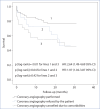The Rate of Coronary Angiography Refusal in Older Patients with Non-ST Elevation Acute Coronary Syndrome and Its Impact on All-Cause Mortality
- PMID: 35317383
- PMCID: PMC8907696
- DOI: 10.14744/SEMB.2021.69908
The Rate of Coronary Angiography Refusal in Older Patients with Non-ST Elevation Acute Coronary Syndrome and Its Impact on All-Cause Mortality
Abstract
Objectives: Significant number older patients with acute coronary syndrome (ACS) cannot undergo coronary angiography (CAG) due to various comorbidities. Patient's refusal of invasive procedures is common among old patients and has not been thoroughly investigated in the context of ACS. We wanted to assess CAG refusal rate and its impact on all-cause mortality in older patients with non-ST elevation acute myocardial infarction.
Methods: In this retrospective study, patients over 75 years of age admitted with acute non-ST elevation ACS were included in the study. Patients were divided into three groups based on the treatment strategy; Group 1: Those who underwent CAG; Group 2: Refused; and Group 3: Deemed unsuitable for procedure due to severe comorbidities. The primary outcomes were to assess the patient refusal rate and its impact on all-cause mortality.
Results: The study included 201 elderly patients. Eighty-two (41%) patients did not undergo CAG and of those, 48 (24%) had severe comorbidities, and 34 (17%) refused the procedure. The in-hospital mortality for patients who underwent, refused, or could not undergo CAG was 5.0%, 0%, and 16.7% (p<0.01); 30-day mortality 8.5%, 9.1%, and 25% (p=0.01); and long-term mortality was 20.2%, 35.3%, and 47.9% (p<0.01), respectively. The median follow-up was 12 months. Hazard ratio of treatment refusal for long-term mortality was 1.97 (1.02-3.87, 95% CI).
Conclusion: Substantial number of elderly patients with ACS refuses to undergo CAG and this leads to increased mortality. Factors affecting patient behavior and the decision-making process should be explored.
Keywords: Coronary artery disease; elderly; treatment refusal.
Copyright © by The Medical Bulletin of Sisli Etfal Hospital.
Figures



Similar articles
-
Editor's Choice-Medically managed patients with non-ST-elevation acute myocardial infarction have heterogeneous outcomes, based on performance of angiography and extent of coronary artery disease.Eur Heart J Acute Cardiovasc Care. 2017 Apr;6(3):262-271. doi: 10.1177/2048872615626354. Epub 2016 Jan 12. Eur Heart J Acute Cardiovasc Care. 2017. PMID: 26758543
-
Comparison of Acute Versus Subacute Coronary Angiography in Patients With NON-ST-Elevation Myocardial Infarction (from the NONSTEMI Trial).Am J Cardiol. 2019 Sep 15;124(6):825-832. doi: 10.1016/j.amjcard.2019.06.007. Epub 2019 Jun 24. Am J Cardiol. 2019. PMID: 31324357 Clinical Trial.
-
Timing of angiography with a routine invasive strategy and long-term outcomes in non-ST-segment elevation acute coronary syndrome: a collaborative analysis of individual patient data from the FRISC II (Fragmin and Fast Revascularization During Instability in Coronary Artery Disease), ICTUS (Invasive Versus Conservative Treatment in Unstable Coronary Syndromes), and RITA-3 (Intervention Versus Conservative Treatment Strategy in Patients With Unstable Angina or Non-ST Elevation Myocardial Infarction) Trials.JACC Cardiovasc Interv. 2012 Feb;5(2):191-9. doi: 10.1016/j.jcin.2011.10.016. JACC Cardiovasc Interv. 2012. PMID: 22361604
-
Acute coronary care in the elderly, part I: Non-ST-segment-elevation acute coronary syndromes: a scientific statement for healthcare professionals from the American Heart Association Council on Clinical Cardiology: in collaboration with the Society of Geriatric Cardiology.Circulation. 2007 May 15;115(19):2549-69. doi: 10.1161/CIRCULATIONAHA.107.182615. Circulation. 2007. PMID: 17502590 Review.
-
[Patients with non-ST-elevation acute coronary syndrome managed without coronary revascularization: an undertreated population].G Ital Cardiol (Rome). 2016 Oct;17(10):816-826. doi: 10.1714/2464.25800. G Ital Cardiol (Rome). 2016. PMID: 27869899 Review. Italian.
References
-
- Mathers CD, Stevens GA, Boerma T, White RA, Tobias MI. Causes of international increases in older age life expectancy. Lancet. 2015;385:540–8. - PubMed
-
- Mehta H, Sacrinty M, Johnson D, Clair M, St, Paladenech C, Robinson K. Comparison of usefulness of secondary prevention of coronary disease in patients <80 versus ≥80 years of age. Am J Cardiol. 2013;112:1099–103. - PubMed
-
- Roffi M, Patrono C, Collet JP, Mueller C, Valgimigli M, Andreotti F, et al. ESC Scientific Document Group. 2015 ESC Guidelines for the management of acute coronary syndromes in patients presenting without persistent ST-segment elevation: Task Force for the Management of Acute Coronary Syndromes in Patients Presenting without Persistent ST-Segment Elevation of the European Society of Cardiology (ESC). Eur Heart J. 2016;37:267–315. - PubMed
-
- Authors/Task Force members. Windecker S, Kolh P, Alfonso F, Collet JP, Cremer J, Falk V, et al. 2014 ESC/EACTS Guidelines on myocardial revascularization: The Task Force on Myocardial Revascularization of the European Society of Cardiology (ESC) and the European Association for Cardio-Thoracic Surgery (EACTS)Developed with the special contribution of the European Association of Percutaneous Cardiovascular Interventions (EAPCI). Eur Heart J. 2014;35:2541–619. - PubMed
LinkOut - more resources
Full Text Sources
